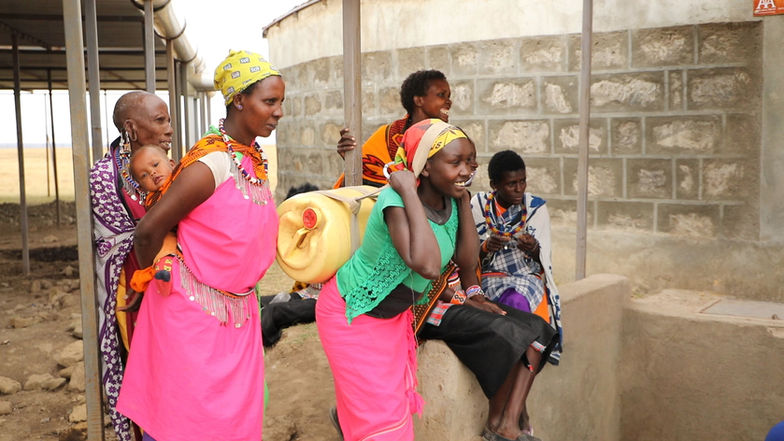
.png)
WASH (Water, Sanitation and Hygiene)
The Maa Trust’s WASH programme improves health, dignity, and education outcomes across the Mara by ensuring access to clean water, safe sanitation, and vital hygiene knowledge. Through community trainings, school-based initiatives, and women-led innovations, the programme tackles preventable diseases, reduces stigma around menstrual health, and empowers future generations to lead healthier lives.
Hygiene Training and Community Impact
The Maa Trust, in collaboration with Public Health Officers, delivered extensive Water, Sanitation, and Hygiene (WASH) training in Pardamat and Nyekweri, reaching 1,535 community members (737 men and 798 women).
The sessions covered essential topics such as handwashing, menstrual hygiene, waste management, toilet use, and water safety, equipping participants with practical tools to reduce sanitation-related diseases. A key feature was the use of the sanitation ladder visual tool, enabling communities to understand and adopt improved practices in a culturally relevant way.
Special focus was placed on Menstrual Hygiene Management (MHM), with 568 women from 15 Maa Beadwork groups trained on overcoming challenges related to sanitation facilities, access to menstrual products, and social stigma.
By encouraging open dialogue and building confidence, the sessions reduced absenteeism among schoolgirls, fostered dignity, and promoted women’s wellbeing. Alongside this, targeted training on water safety and waste management reached 621 community members, addressing safe handling, treatment, and disposal practices to safeguard both human and environmental health.
Together, these initiatives are shifting attitudes and behaviours, building healthier families, and embedding sanitation as a cornerstone of community resilience.
School Engagement and Behaviour Change
The WASH programme also prioritised schools through Mara Champions Clubs in 14 primary schools, training 1,080 pupils in personal hygiene, proper latrine use, and infrastructure management. These efforts not only improved school sanitation but also helped students champion hygiene practices in their homes, amplifying the programme’s reach across entire communities.
Sustainable behaviour change was advanced through Community-Led Total Sanitation (CLTS). In 2024, 337 new toilets were constructed, significantly improving safe sanitation access. Follow-up household visits engaged 884 community members, reinforcing long-term commitment to ending open defecation and sustaining healthier practices.
Innovation and Sustainable Solutions
Innovation in menstrual health also took a leap forward with the training of four women in eco-friendly sanitary pad production. These women produced 281 reusable maternity pads and 400 reusable wipes for the Talek Clinic Mama Kit initiative, providing an affordable, sustainable solution while generating income for the artisans.
Continued mentorship is ensuring long-term capacity, with potential to scale production for wider distribution. Through training, infrastructure, and sustainable enterprise, WASH is improving community health outcomes, empowering women, and supporting environmentally responsible solutions — ensuring the Mara thrives with dignity and resilience.
By the Numbers
.png)
1,535
Community members trained in hygiene, sanitation, and water safety.

337
Toilets constructed through Community-Led Total Sanitation initiatives.

281
Reusable maternity pads produced, fostering health and sustainable livelihoods.
.png)



